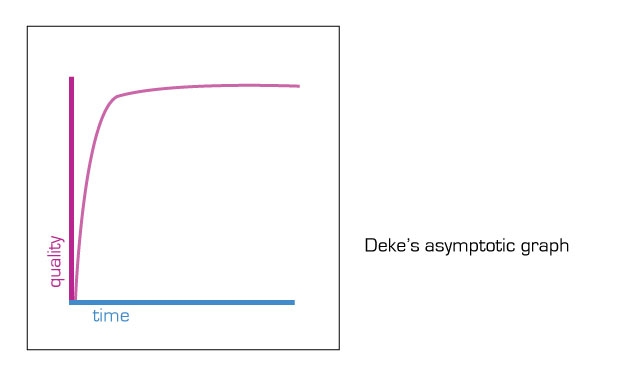Origin From: Total Vocal
Author: Deke Sharon
Date: 2012-12-31
If you're in the mood for a little new year's motivation, I've got an essay for you that has been making the rounds.
Warning: it's not for the faint of heart. Only read it if you're serious about wanting a full blown wakeup call:
http://www.cracked.com/blog/6-harsh-truths-that-will-make-you-better-person/
I'm guessing the central point that will bother many of you is the idea that you'll be judged by what you do and not who you are.
And yet, the thesis comes full circle by insisting that the only way to measure who you are is by what you do. Sit in your room all day thinking nice thoughts about people? No one cares. Pick up a hammer and help rebuild someone's house, and you're an actual nice person, as actions speak louder than words.
A powerful message for the new year.
Taking that idea as a springboard, I'd like to add one more coefficient in the formula: the more you do, the better you are.
We all know perfectionists, and many of us need look no further than the mirror to find one... and yet we all also realize, at least conceptually, that perfection is an unattainable state. It doesn't exist. There is no perfection.
So, then, what is happening in one's quest for perfection? Let's look at the graph. (on the top)
That kind of graph is called "asymptotic" and has the unique characteristic that it never reaches the top line. Like Zeno's paradox, you keep getting closer to perfection, but of course never reach it.
Bummer.
So, if you're never going to reach perfection, once you cross the threshold of "great," what's the point in spending increasing amounts of time to inch closer to perfection?
Let's say there's a moment in your process at which you reach 90 "percent of perfection" mark (which we'll call "great"), and then it takes the same amount of time to reach 95%, and then the same amount of time again to reach 97.5%, and yet again 98.75%, and so on.
Ars longa and vita brevis, right? Art is long and life is short, so you should make something as close to perfect as you can, as it will outlast you! Perfect thinking... except for one small problem. Two problems, actually: first, there is no perfect thinking. Thinking is often flawed, as is your ability to judge your own art. The more art you make, the better you'll get at it (remember, 10,000 hours or so is what you need to achieve mastery - http://en.wikipedia.org/wiki/Outliers_(book)).
The second problem is the problem with your math: Art is long, indeed, but that's not the resource that's limited. Your life is! You only have so many hours to create, and so many chances in life, and one is passing you by right this very instant. There went another. Yeah, I know, cruel, but true.
Basically, you can't tell great from genius, and moreover you're wasting your precious time doing so. Looking at that graph above, you can have one creation at your 98% mark, or 4 at the 90% mark. And you can't really tell 90% from 98%, as the quality of your work will ultimately not be decided by you. In fact, once you think you've created something that's great, you should probably stop, as you might just be making it worse. There are many, many quotes about finishing a work of art, and they all have the same theme: it's difficult to know when to quit, it's hard to quit, and the mark of a great artist is knowing to quit sooner than you expect. Here's a good one from Stravinsky "Too many pieces of music finish too long after the end."
Am I not making sense? Let's try a different angle. Let's say you want to get good at shooting free throws. You can stand, and meditate on shooting the ball for 5 minutes and then shoot, or you can shoot, shoot, shoot, shoot, adjust, shoot, shoot, shoot... You can get good at preparing and polishing, or you can get good at completing. Completion is far, far more useful.
Elton John, Billy Joel, Randy Newman and many other professional songwriters will sit down at the piano and write a song every day, even if they're not inspired, even if they don't have a deadline or specific task at hand. And you know what? I'll bet those guys have written hundreds, perhaps thousands of lousy songs. But you know what else? They've also written some gems.
And you know what else else? They didn't decide which of their songs were gems. You and the public did. They often can't tell. Ask them their favorite songs, and they'll probably mention some obscure B-side that holds special meaning to them. They're unable to tell, which is why labels don't let artists choose their own lead single, and more importantly why you shouldn't be polishing, polishing, perfecting that single song. You should be writing a hundred.
You don't have to agree with me, and I might not be correct, but the numbers don't lie: you can have one lottery ticket or you can have 1,000. You can spend a long time thinking about which songs might make a great arrangement, or you can arrange them all and find out. You can wait for the phone to ring offering that perfect gig, or you can go downtown and stand between two garbage cans and start singing and make your own luck.
And with each free throw, your chances will get slightly better the each time you shoot.
Quantity IS quality, because once you've got a pile of something, somewhere in that pile will be something the world really wants. If the pile's big enough, something in there might even be genius.
And if you disagree, go ahead, prove me wrong.






